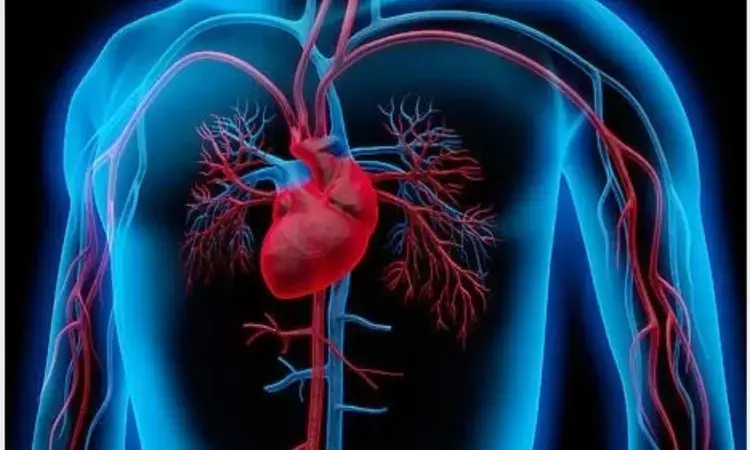- Home
- Medical news & Guidelines
- Anesthesiology
- Cardiology and CTVS
- Critical Care
- Dentistry
- Dermatology
- Diabetes and Endocrinology
- ENT
- Gastroenterology
- Medicine
- Nephrology
- Neurology
- Obstretics-Gynaecology
- Oncology
- Ophthalmology
- Orthopaedics
- Pediatrics-Neonatology
- Psychiatry
- Pulmonology
- Radiology
- Surgery
- Urology
- Laboratory Medicine
- Diet
- Nursing
- Paramedical
- Physiotherapy
- Health news
- Fact Check
- Bone Health Fact Check
- Brain Health Fact Check
- Cancer Related Fact Check
- Child Care Fact Check
- Dental and oral health fact check
- Diabetes and metabolic health fact check
- Diet and Nutrition Fact Check
- Eye and ENT Care Fact Check
- Fitness fact check
- Gut health fact check
- Heart health fact check
- Kidney health fact check
- Medical education fact check
- Men's health fact check
- Respiratory fact check
- Skin and hair care fact check
- Vaccine and Immunization fact check
- Women's health fact check
- AYUSH
- State News
- Andaman and Nicobar Islands
- Andhra Pradesh
- Arunachal Pradesh
- Assam
- Bihar
- Chandigarh
- Chattisgarh
- Dadra and Nagar Haveli
- Daman and Diu
- Delhi
- Goa
- Gujarat
- Haryana
- Himachal Pradesh
- Jammu & Kashmir
- Jharkhand
- Karnataka
- Kerala
- Ladakh
- Lakshadweep
- Madhya Pradesh
- Maharashtra
- Manipur
- Meghalaya
- Mizoram
- Nagaland
- Odisha
- Puducherry
- Punjab
- Rajasthan
- Sikkim
- Tamil Nadu
- Telangana
- Tripura
- Uttar Pradesh
- Uttrakhand
- West Bengal
- Medical Education
- Industry
Triple and double therapy prior to MTEER independently linked to reduced risk of mortality or HFH one year after intervention

A recent analysis published in European Heart Journal has revealed a significant gap in the use of guideline-directed medical therapy (GDMT) among patients with mitral regurgitation (MR) who subsequently undergo transcatheter edge-to-edge repair (TEER) using the MitraClip device.
This study conducted by Anubodh Varshney and colleagues based on data from the Society of Thoracic Surgeons/American College of Cardiology TVT Registry, found that only one in five patients received the recommended triple therapy of renin-angiotensin-aldosterone system (RAAS) inhibitors or angiotensin receptor-neprilysin inhibitors (ARNI), beta-blockers, and mineralocorticoid receptor antagonists (MRA) before TEER.
To evaluate the real-world use of guideline-directed medical therapy (GDMT) among MR patients undergoing TEER, researchers analyzed data from the Society of Thoracic Surgeons/American College of Cardiology TVT Registry.
- The study included 4,199 MR patients with pre-procedure left ventricular ejection fraction (LVEF) less than 50% who underwent TEER. GDMT typically consists of renin-angiotensin-aldosterone system (RAAS) inhibitors or angiotensin receptor-neprilysin inhibitors (ARNI), beta-blockers, and mineralocorticoid receptor antagonists (MRA). However, only 19.2% of patients received triple therapy before TEER.
- For the subset of patients (n=2,014) eligible for one-year follow-up from 341 sites, the study revealed varying rates of one-year mortality or hospitalisation for heart failure (HFH) based on their GDMT regimen.
- Patients who received triple therapy exhibited the lowest composite rate (23.1%), followed by those on double therapy (24.8%), single therapy (35.7%), and no therapy (41.1%). These differences were statistically significant (P < 0.01), underscoring the impact of GDMT on patient outcomes.
- Furthermore, associations between GDMT and outcomes remained significant after accounting for pertinent clinical characteristics.
- Patients prescribed triple therapy demonstrated a lower risk (adjusted hazard ratio [aHR] 0.73, 95% CI 0.55-0.97), as did those on double therapy (aHR 0.69, 95% CI 0.56-0.86), in comparison to those receiving no or single therapy prior to MTEER.
These findings emphasise the independent influence of GDMT on reducing the risk of adverse events, such as mortality or HFH, one year after the intervention.
In summary, this study highlights a concerning pattern of suboptimal GDMT utilisation among HF patients undergoing TEER for FMR. Adherence to guideline recommendations for GDMT is critical, as it was associated with a reduced risk of adverse events, including mortality and HFH, one year after the intervention. Efforts to improve GDMT compliance in clinical practice are essential to enhance patient outcomes.
Reference:
Varshney, A. S., Shah, M., Vemulapalli, S., Kosinski, A., Bhatt, A. S., Sandhu, A. T., Hirji, S., DeFilippis, E. M., Shah, P. B., Fiuzat, M., O’Gara, P. T., Bhatt, D. L., Kaneko, T., Givertz, M. M., & Vaduganathan, M. Heart failure medical therapy prior to mitral transcatheter edge-to-edge repair: The STS/ACC transcatheter valve therapy registry. European Heart Journal,2023:ehad584. https://doi.org/10.1093/eurheartj/ehad584
MBBS, MD , DM Cardiology
Dr Abhimanyu Uppal completed his M. B. B. S and M. D. in internal medicine from the SMS Medical College in Jaipur. He got selected for D. M. Cardiology course in the prestigious G. B. Pant Institute, New Delhi in 2017. After completing his D. M. Degree he continues to work as Post DM senior resident in G. B. pant hospital. He is actively involved in various research activities of the department and has assisted and performed a multitude of cardiac procedures under the guidance of esteemed faculty of this Institute. He can be contacted at editorial@medicaldialogues.in.
Dr Kamal Kant Kohli-MBBS, DTCD- a chest specialist with more than 30 years of practice and a flair for writing clinical articles, Dr Kamal Kant Kohli joined Medical Dialogues as a Chief Editor of Medical News. Besides writing articles, as an editor, he proofreads and verifies all the medical content published on Medical Dialogues including those coming from journals, studies,medical conferences,guidelines etc. Email: drkohli@medicaldialogues.in. Contact no. 011-43720751


